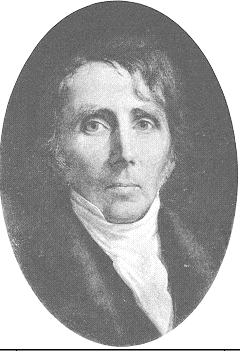|

|
Chapter 4: American Transcendentalism
William Ellery
Channing
1780-1842
|
©
Paul P. Reuben
September 7, 2019
E-Mail
|
Page Links: |
A Brief
Sketch |
Selected
Bibliography |
MLA Style
Citation of this Web Page
|

(Photo source: William
Ellery Channing Center)
Channing,
William Ellery (b. April 7, 1780, Newport, R.I. d. Oct. 2, 1842,
Bennington, Vt., U.S.)
U.S. author and moralist,
Congregationalist and, later, Unitarian clergyman. Known as the
"apostle of Unitarianism," Channing was a leading figure in the
development of New England Transcendentalism and of organized
attempts in the U.S. to eliminate slavery, drunkenness, poverty, and
war.
He studied theology in
Newport and at Harvard and soon became a successful preacher in
various churches in the Boston area. From June 1, 1803, until his
death he was minister of the Federal Street Church, Boston.
Preferring to avoid abstruse points of doctrine, he preached
morality, charity, and Christian responsibilities. He became a
popular speaker on ceremonial occasions and reached an even larger
audience by writing for liberal Boston periodicals, one of which was
The Christian Disciple (from 1824 called The Christian Examiner). In
1815 he was attacked by the orthodox Calvinist periodical The
Panoplist, whose editor, Jedidiah Morse, denounced the Boston clergy
as "Unitarian" rather than Christian. During the next five years
Channing issued several defenses of his position, especially
"Unitarian Christianity," a sermon delivered at an ordination in
Baltimore in 1819.
Reluctantly accepting the
label of Unitarianism, Channing described his faith as "a rational
and amiable system, against which no man's understanding, or
conscience, or charity, or piety revolts." Although he did not wish
to found a denomination, believing that a Unitarian orthodoxy would
be just as oppressive as any other, he formed (1820) a conference of
liberal Congregational ministers, later (May 1825) reorganized as the
American Unitarian Association.
Channing sympathized with
the beliefs of several social and educational reform movements but
did not believe that society could be improved by collective action.
He denied that government--the only legitimate function of which was,
in his view, the essentially negative one of maintaining public
order--could advance the moral sensibility of the human race.
In his time, Channing's
reputation as a man of letters was based on several long
essay-reviews, among the first of their kind in the U.S. One took
John Milton's "Treatise on Christian Doctrine" as a starting point;
another, Sir Walter Scott's biography of Napoleon I, in whose career
Channing saw the great social danger of taking prominent soldiers for
heroes. Most of his manuscripts were destroyed by fire. -
The
Encyclopedia Britannica
Selected Bibliography
Brown, Arthur W. Always
Young for Liberty: A Biography of WEC. Syracuse: Syracuse UP,
1956. BX9869.C4 B84
- - -. William Ellery
Channing. NY: Twayne, 1962. BX9869.C4 B86
Channing, William Henry. ed.
Memoir of William Ellery Channing. 3 vols. 1848.
Fritchman, Stephen H. Men
of Liberty; Ten Unitarian Pioneers. NY: Kennikat Press, 1968.
BX9867 F7
Han, John J. "William Ellery
Channing (1780-1842)." in Knight, Denise D. ed. Writers of the
American Renaissance: An A-to-Z Guide. Westport, CT: Greenwood,
2003.
Lyttle, David. Studies in
Religion in Early American Literature: Edwards, Poe, Channing,
Emerson, Some Minor Transcendentalists, Hawthorne, and Thoreau.
Lanham, MD : UP of America, 1983.
Mendelsohn, Jack.
Channing, the reluctant radical; a biography. Boston: Little,
Brown, 1971. BX9869 C4 M45
Patterson, Robert L. The
philosophy of William Ellery Channing. NY: Bookman, 1952. B908
.C44 P3
Robinson, David. ed.
William Ellery Channing: Selected Writings. Mahwah, NJ :
Paulist, 1985. BX9815 .C42
- - -. "William Ellery
Channing." in Mott, Wesley T. ed. The American Renaissance
in New England. Detroit: Thomson Gale, 2001.
Author: Robinson, David M.
In: Mott, Wesley T. (ed. and introd.); xxiii, 533 pp.; The American
Renaissance in New England: Third Series; Thomson Gale, Detroit, MI
Publication: 2001
Toulouse, Teresa. The Art
of Prophesying: New England Sermons and the Shaping of Belief.
Athens: U of Georgia P, 1987.
Wagenknecht, Edward C.
Ambassadors for Christ: Seven American Preachers. New York:
Oxford U.P., 1972. BV4208.U6 W34
MLA Style
Citation of this Web Page:
Reuben, Paul P.
"Chapter 4: William Ellery Channing." PAL: Perspectives in
American Literature- A Research and Reference Guide. WWW URL: http://www.paulreuben.website/pal/chap4/channing_ellery.html
(provide page date or date of your login).
| Top
|

